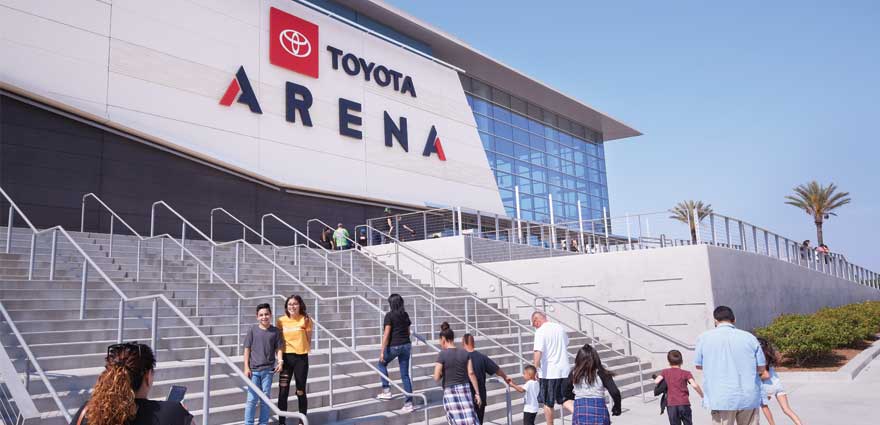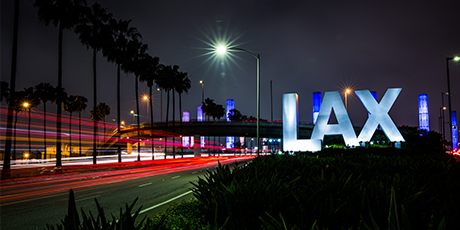The Los Angeles Rams football team is building on the former Hollywood Park horse racing track what promises to be more than a showcase stadium seating some 70,000 fans of the Rams and the Los Angeles Chargers. Both teams will play home games there. The sprawling SoFi Stadium complex will also feature a 6,000-seat performance center, a movie theater, hotel, office buildings, shops, restaurants and residences.
“(Sofi stadium) is intended to be more integrated into the local community. Contrast it with the Oracle Arena (in Oakland) surrounded by parking lots.”
The new mixed-use sports venue model has already been launched, albeit at a smaller scale, with the Golden 1 Center in Sacramento and the Chase Center in San Francisco, both of which included a public plaza, restaurants and other development surrounding their arenas. A new ballpark for the Oakland A’s is envisioned for that city’s downtown waterfront.
That flurry of new mixed-use sports infrastructure in California is designed to inspire both local visitors and sports tourists to come and stay all day or weekend, hours before or after the game. It also puts California cities in play for major tourism magnets. Sofi will host the 2022 Super Bowl and 2023 College Football Championship and the Opening and Closing Ceremonies of the 2028 Olympic Games.
The tourism windfall for such events is staggering. Super Bowl LII in 2018, and its 10 days of events, brought $450 million in revenue to Minneapolis, or $370 million when accounting for tourism spending that was displaced by the Super Bowl, according to the Minnesota Super Bowl Host Committee.
The construction of the Chase Center, the new home of the Golden State Warriors, makes the city a top contender to host the coveted NBA All-Star Game, which draws thousands of fans from around the world for a whole weekend.
“We fully expect the Chase Center will host an All-Star Game in the near future.”
Even without an all-star game, the Chase Center is expected to generate $14.1 million in tax revenue in its first year of operation, Johnston said.
“Restaurants and other amenities are coming in, some open now and some opening over the course of the year,” he said. “The entire Mission Bay area is emerging as a diverse multifaceted neighborhood with (UC-San Francisco) one anchor tenant and the Giants and Warriors as another.”
New Major League Sports Venues in California
- SoFi Stadium, opens 2020, Inglewood, Los Angeles Rams, Los Angeles Chargers
- Chase Center, 2019, San Francisco, Golden State Warriors
- Banc of California Stadium, 2018, Los Angeles, Los Angeles Football Club
- Golden 1 Center, 2016, Sacramento, Sacramento Kings
- Levi’s Stadium, 2014, Santa Clara, San Francisco 49ers
- Sacramento Soccer Stadium, 2022 (estimated) Sacramento Republic Football Club
- Oakland A’s baseball field, proposed, Oakland
The Golden 1 Center, the home of the Sacramento Kings basketball team, includes a 16-story mixed use tower housing a 250-room hotel, private residences as well as retail and office space. The complex has jump-started downtown Sacramento as opposed to the Kings’ former home, the Sleep Train Arena, which floats in its own asphalt sea in the Natomas neighborhood seven miles northwest of the city center.
The Golden 1 Center has stayed busy even when the Kings aren’t playing by hosting concerts, NCAA basketball games and other events, said Mike Testa, president and CEO of Visit Sacramento, the state capital’s tourism promotion agency.
Visit Sacramento is completing a study quantifying just how much additional economic activity the arena has brought to the city’s downtown, he said.
“The biggest change for the new arena is all the programming on Monday through Wednesday nights so suddenly there’s restaurant activity there, and the difference was before you’d drive in for an event at Sleep Train (Arena) and you’d drive out when it’s over,” Testa said. “This is keeping people downtown and creating a sense of place rather than drive in and drive out.”


